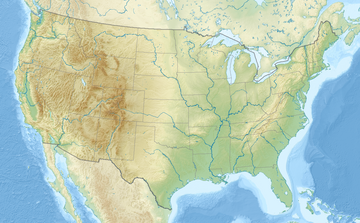Colts and Rams exchange owners
On July 13, Robert Irsay and Willard Keland bought the Los Angeles Rams from the estate of Dan Reeves and transferred ownership to Carroll Rosenbloom, in exchange for ownership of the Baltimore Colts.[2][3][4]
Draft
The 1972 NFL Draft was held from February 1 to 2, 1972 at New York City's Essex House. With the first pick, the Buffalo Bills selected defensive end Walt Patulski from the University of Notre Dame.
New officials
Referee Jack Vest, the referee for Super Bowl II, the 1969 AFL championship game and 1971 AFC championship game, was killed in a June motorcycle accident. Chuck Heberling was promoted from line judge to fill the vacancy and kept Vest's crew intact. Heberling's line judge vacancy was filled by Red Cashion, who was promoted to referee in 1976 and worked in the league through 1996, earning assignment to Super Bowl XX and Super Bowl XXX.
Division races
From 1970 through 2002, there were three divisions (East, Central and West) in each conference. The winners of each division, and a fourth "wild card" team based on the best non-division winner, qualified for the playoffs. The tiebreaker rules were changed to start with head-to-head competition, followed by division records, common opponents records, and conference play.
| Week
|
East
|
|
Central
|
|
West
|
|
Wild Card
|
|
| 1
|
Dallas, St. Louis, Washington
|
1–0–0
|
Detroit, Green Bay
|
1–0–0
|
Atlanta, San Francisco, Los Angeles
|
1–0–0
|
5 teams
|
1–0–0
|
| 2
|
Dallas, Washington
|
2–0–0
|
Minnesota
|
1–1–0
|
Los Angeles
|
1–0–1
|
Dallas, Washington
|
2–0–0
|
| 3
|
Washington
|
2–1–0
|
Detroit, Green Bay
|
2–1–0
|
Atlanta, San Francisco
|
2–1–0
|
3 teams
|
2–1–0
|
| 4
|
Washington
|
3–1–0
|
Detroit*
|
3–1–0
|
Los Angeles
|
2–1–1
|
2 teams
|
3–1–0
|
| 5
|
Washington
|
4–1–0
|
Green Bay
|
4–1–0
|
Los Angeles
|
3–1–1
|
Dallas
|
4–1–0
|
| 6
|
Washington
|
5–1–0
|
Green Bay*
|
4–2–0
|
Los Angeles
|
4–1–1
|
4 teams
|
4–2–0
|
| 7
|
Washington
|
6–1–0
|
Green Bay*
|
4–3–0
|
Los Angeles
|
4–2–1
|
Dallas
|
5–2–0
|
| 8
|
Washington
|
7–1–0
|
Green Bay*
|
5–3–0
|
Los Angeles
|
5–2–1
|
Dallas
|
6–2–0
|
| 9
|
Washington
|
8–1–0
|
Green Bay
|
6–3–0
|
Los Angeles
|
5–3–1
|
Dallas
|
7–2–0
|
| 10
|
Washington
|
9–1–0
|
Green Bay
|
7–3–0
|
Los Angeles*
|
5–4–1
|
Dallas
|
8–2–0
|
| 11
|
Washington
|
10–1–0
|
Green Bay*
|
7–4–0
|
San Francisco
|
6–4–1
|
Dallas
|
8–3–0
|
| 12
|
Washington
|
11–1–0
|
Green Bay
|
8–4–0
|
Atlanta
|
7–5–0
|
Dallas
|
9–3–0
|
| 13
|
Washington
|
11–2–0
|
Green Bay
|
9–4–0
|
San Francisco
|
7–5–1
|
Dallas
|
10–3–0
|
| 14
|
Washington
|
11–3–0
|
Green Bay
|
10–4–0
|
San Francisco
|
8–5–1
|
Dallas
|
10–4–0
|
| Week
|
East
|
|
Cent
|
|
West
|
|
Wild Card
|
|
| 1
|
Miami, NY Jets
|
1–0–0
|
Cincinnati, Pittsburgh
|
1–0–0
|
Denver
|
1–0–0
|
Miami, NY Jets
|
1–0–0
|
| 2
|
Miami, NY Jets
|
2–0–0
|
Cincinnati
|
2–0–0
|
All 4 teams
|
1–1–0
|
Miami, NY Jets
|
2–0–0
|
| 3
|
Miami
|
3–0–0
|
Cleveland
|
2–1–0
|
Kansas City
|
2–1–0
|
Pittsburgh, San Diego, Cincinnati, NY Jets
|
2–1–0
|
| 4
|
Miami
|
4–0–0
|
Cincinnati
|
3–1–0
|
Kansas City
|
3–1–0
|
San Diego*
|
2–1–1
|
| 5
|
Miami
|
5–0–0
|
Cincinnati
|
4–1–0
|
Oakland
|
3–1–1
|
NY Jets*
|
3–2–0
|
| 6
|
Miami
|
6–0–0
|
Cincinnati*
|
4–2–0
|
Oakland
|
3–2–1
|
Pittsburgh*
|
4–2–0
|
| 7
|
Miami
|
7–0–0
|
Cincinnati*
|
5–2–0
|
Oakland
|
4–2–1
|
Pittsburgh*
|
5–2–0
|
| 8
|
Miami
|
8–0–0
|
Pittsburgh
|
6–2–0
|
Kansas City
|
5–3–0
|
Cleveland*
|
5–3–0
|
| 9
|
Miami
|
9–0–0
|
Pittsburgh
|
7–2–0
|
Oakland
|
5–3–1
|
Cleveland*
|
6–3–0
|
| 10
|
Miami
|
10–0–0
|
Cleveland
|
7–3–0
|
Oakland
|
6–3–1
|
Pittsburgh
|
7–3–0
|
| 11
|
Miami
|
11–0–0
|
Cleveland
|
8–3–0
|
Oakland
|
7–3–1
|
Pittsburgh
|
8–3–0
|
| 12
|
Miami
|
12–0–0
|
Pittsburgh
|
9–3–0
|
Oakland
|
8–3–1
|
Cleveland
|
8–4–0
|
| 13
|
Miami
|
13–0–0
|
Pittsburgh
|
10–3–0
|
Oakland
|
9–3–1
|
Cleveland
|
9–4–0
|
| 14
|
Miami
|
14–0–0
|
Pittsburgh
|
11–3–0
|
Oakland
|
10–3–1
|
Cleveland
|
10–4–0
|
Television
This was the third year under the league's four-year broadcast contracts with ABC, CBS, and NBC to televise Monday Night Football, the NFC package, and the AFC package, respectively.[6]
Three games were not televised at all due to an International Brotherhood of Electrical Workers strike against CBS: Washington at New York Jets (November 5), Philadelphia at New York Giants (November 26) and New Orleans at New York Jets (December 3).
